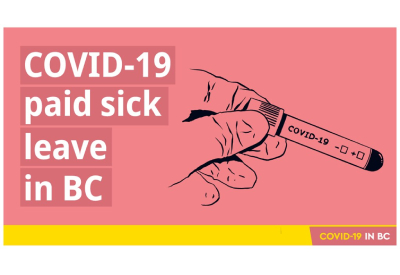B.C Announces Paid Sick Leave Program

May 14, 2021
Workers will soon have access to a made-in-B.C. paid sick leave program that will support workers to stay home when they are sick during the pandemic and afterward, including permanent paid sick leave, as a result of legislation tabled Tuesday, May 11, 2021.
To better support workers during the pandemic, amendments to the Employment Standards Act will bring in three days of paid sick leave related to COVID-19, such as having symptoms, self-isolating and waiting for a test result. Employers will be required to pay workers their full wages and the Province will reimburse employers without an existing sick leave program up to $200 per day for each worker to cover costs.
“The best way to protect workers, their families and co-workers during this pandemic is to have a paid sick leave program in place,” said Premier John Horgan. “Our made-in-B.C. program will help cover the costs for hard-hit businesses so we can all get through this pandemic together and move to a strong economic recovery.”
The legislation will also create a permanent paid sick leave for workers who cannot work due to any illness or injury beginning Jan. 1, 2022. The number of paid sick days and other supports will be determined following consultations with the business community, labour organizations, Indigenous partners and other stakeholders.
“We are stepping up to create permanent paid sick leave protection for British Columbians as part of our commitment to a better future for workers and workplaces,” said Harry Bains, Minister of Labour. “We will consult widely and base the long-term entitlement on what we hear, so it meets the needs of workers and supports healthy businesses.”
The short-term paid sick leave related to COVID-19 will bridge the gap for workers between when they first feel sick and when they can access the federal Canada Recovery Sickness Benefit. B.C.’s COVID-19 paid sick leave will continue to protect workers longer – to Dec. 31, 2021.
To support this leave, WorkSafeBC will set up and, beginning next month, administer the employer reimbursement program on behalf of the Province. This will include reimbursing employers up to $200 per day per worker. For the small percentage of employers that have a highly paid workforce, but do not already have paid sick leave, those employers will be required to cover any remaining wages owed above $200 for each COVID-19 sick day taken.
“Since the outset of this pandemic, B.C. has led the way in supporting workers and making sure they don’t go to work when they’re sick,” Bains said. “As a result of this legislation, if a worker wakes up in the morning and feels unwell, they can stay home in self-isolation and get tested without worrying about losing their income. This is good for workers, good for businesses and good for the economy. It will help avoid workplace transmission and put the pandemic behind us.”
These amendments build on a series of legislative improvements and supports provided by the B.C. government, the Ministry of Labour and WorkSafeBC since the beginning of the pandemic.
Go HERE for information on the COVID-19 paid sick leave
Go HERE for more information on B.C.’s employment standards
Go HERE for more information on federal Employment Insurance sickness benefits











![Guide to the Canadian Electrical Code, Part 1[i], 26th Edition– A Road Map: Section 56](https://electricalindustry.ca/wp-content/uploads/2022/11/Guide-CE-Code-2.png)



